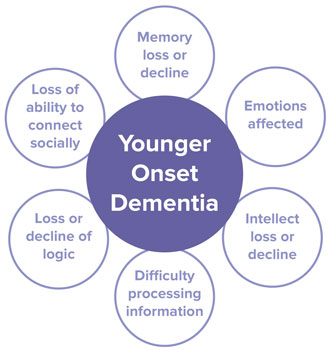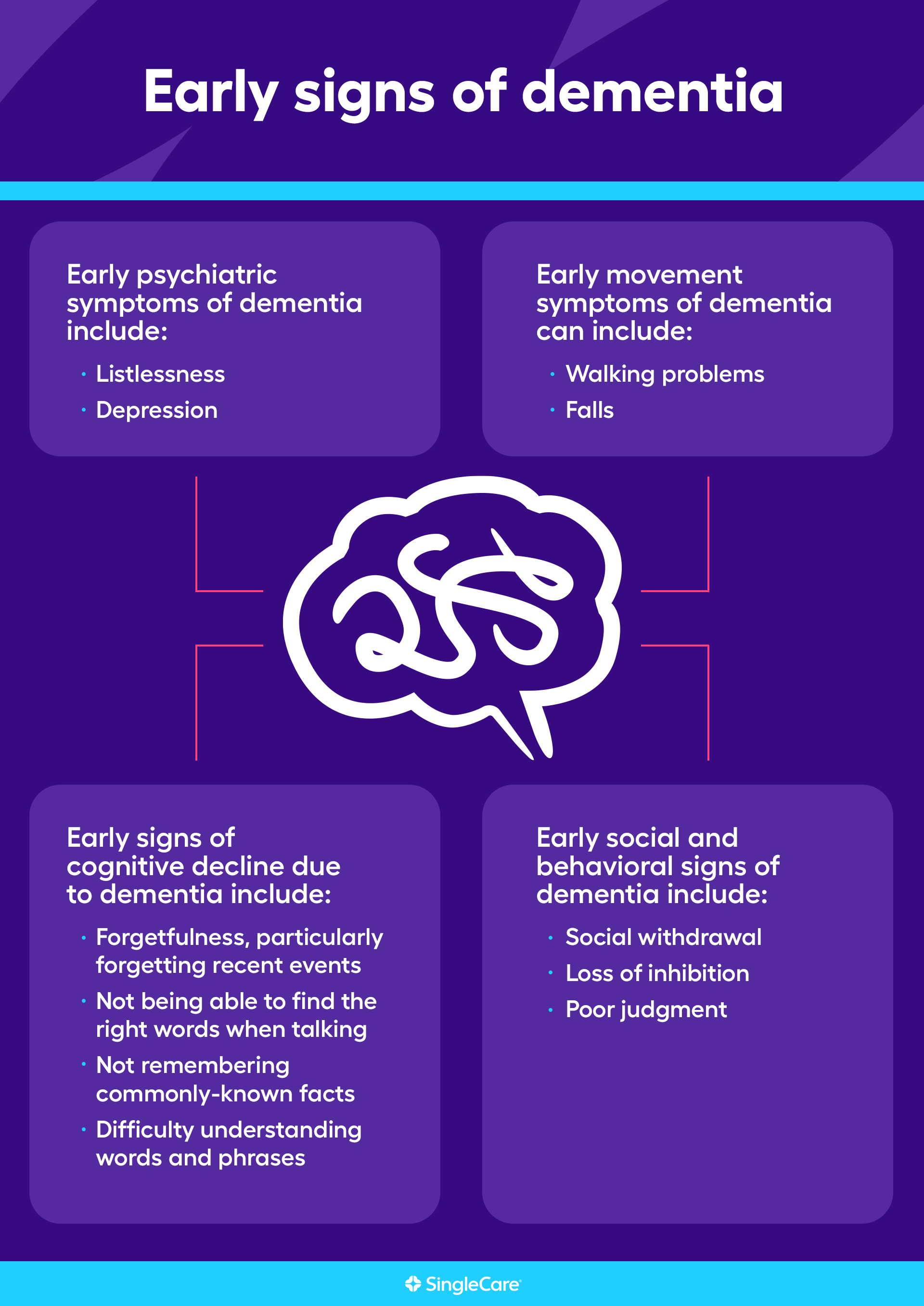Recognizing the Impact of Dementia on Every Day Life and Caregiving
Mental deterioration influences everyday life in profound methods, impacting not just those identified however also their caregivers. As cognitive decrease progresses, you may notice adjustments in communication and regular that challenge both celebrations.
The Phases of Dementia and Their Impacts on Every Day Life
As you navigate the journey of mental deterioration, comprehending its stages can significantly impact exactly how you manage every day life. Mental deterioration normally progresses via 3 major phases: early, middle, and late. In the onset, you may see occasional memory gaps or difficulty locating the best words. This can lead to stress, however recognizing these indications early helps you adjust your routine and seek support.
During the center stage, you'll experience more visible cognitive decline. Daily jobs may become challenging, and keeping your freedom might need modifications. Utilizing tips and simplifying your atmosphere can assist.
In the late stage, people often require considerable help with everyday tasks. Preparation for care ends up being vital, concentrating on comfort and quality of life. By understanding these stages, you're much better geared up to respond proactively, guaranteeing you or your enjoyed one can browse the obstacles with self-respect and elegance.

Modifications in Interaction and Social Interaction
Exactly how do changes in interaction impact your everyday communications as mental deterioration advances? As dementia advancements, you might discover that basic discussions come to be tough.
You may locate it easier to connect through these ways instead of relying exclusively on spoken language. Paying attention abilities can additionally change; you could locate it tougher to bear in mind or comply with conversations what was simply claimed (Frontotemporal Dementia). This can result in misconceptions or sensations of seclusion
Urging patience and developing a helpful environment can help. Taking part in activities that cultivate link, like songs or art, can enhance social interactions. Bear in mind, maintaining connections is still feasible; it's almost adapting to brand-new methods of connecting.
Influence On Daily Routines and Activities
While maneuvering day-to-day regimens, you'll likely observe that jobs you once completed easily come to be much more difficult as mental deterioration advances. Straightforward activities like food preparation, clothing, or even showering may need even more effort and time. You might discover on your own forgetting actions in acquainted routines or having a hard time to remember where you put things. This can result in irritation not just for you, however also for those around you.
Adapting your setting can help; for instance, classifying things or making use of checklists can simplify tasks. Engaging in repetitive, organized tasks can also give convenience and a sense of success. Remember, it's fine to ask for help.
Psychological and Behavior Challenges
Steering via day-to-day regimens can produce not simply functional obstacles, but also psychological and behavioral ones. You may notice modifications in mood, such as increased anxiousness or aggravation, which can originate from confusion or difficulty in completing jobs. As you navigate these minutes, it is crucial to acknowledge that your liked one might express their sensations with actions like anxiety or withdrawal.
These psychological actions can be unpredictable and might occur without warning, leaving you both sensation overwhelmed. You could discover that acquainted atmospheres or regimens can help in reducing stress and anxiety, however preserving persistence becomes significant. It is essential to confirm their sensations, even if you don't fully comprehend them.
The Role of Caregivers in Sustaining Individuals With Mental Deterioration
As a caregiver, you play an important duty in offering emotional assistance for people with dementia. Developing everyday treatment routines can develop a sense of security and comfort, aiding to alleviate their stress and anxiety. By comprehending their needs and making use of efficient techniques, you can greatly enhance their lifestyle.
Emotional Assistance Approaches
When caring for somebody with dementia, comprehending the emotional landscape is necessary for supplying efficient support. Simple motions, like holding their hand or keeping eye get in touch with, can create a feeling of security. Ultimately, do not neglect to take treatment of your own emotional demands; looking for support for yourself can enhance your capacity to care for them.
Daily Care Routines
Developing day-to-day treatment regimens is essential for offering stability and comfort to individuals with mental deterioration, as these regimens can help in reducing confusion and anxiety. You can start by laying out a regular timetable for dishes, activities, and remainder. This predictability assists your liked one feel more secure and involved.
Incorporate familiar tasks, like folding washing or watering plants, which can stimulate positive memories and foster a sense of success. Use aesthetic hints, such as read this article calendars or lists, to lead them via the day.
Be adaptable, though; adjust regimens as required based upon their state of mind or energy degrees. Early Onset Dementia. Bear in mind, your perseverance and understanding are crucial in navigating their altering requirements, guaranteeing they feel supported and valued throughout their day-to-day life
Creating a Safe and Comfy Living Setting
Creating a comfy and risk-free living environment is important for individuals with mental deterioration. You'll intend to make home security alterations that decrease dangers and assure familiarity to offer a sense of convenience. By concentrating on these elements, you can assist develop a space that sustains both safety and well-being.
Home Safety Modifications
As you navigate the challenges of dementia, making home safety alterations can greatly boost convenience and safety. Label vital locations, such as the restroom and cooking area, with clear indications to assist with orientation. These alterations not only promote security yet additionally motivate freedom, permitting your liked one to really feel even more at simplicity in their setting.
Convenience and Experience
After ensuring a safe atmosphere with required adjustments, promoting convenience and experience is essential for individuals with dementia. Maintain a constant regular to aid them really feel grounded and decrease stress and anxiety. Involving in acquainted activities, such as listening to songs or horticulture, can boost their feeling of belonging, making their living setting a true refuge.
Techniques for Reliable Caregiving and Support
While navigating the difficulties of dementia care can really feel frustrating, implementing effective strategies can greatly improve both the caregiver's and the patient's everyday experience. Beginning by developing a regimen; predictability helps in reducing anxiousness for both you and your enjoyed one. Usage clear, basic communication-- short sentences and straight inquiries can protect against complication.

Do not neglect to look after on your own; timetable breaks and attach with support groups. Sharing experiences with others in similar situations can provide valuable understandings and psychological relief.
Lastly, remain patient and adaptable. Mental deterioration can bring unforeseeable modifications, so adapting your strategy is essential. By using these approaches, you can promote an extra favorable setting that profits both you and your liked one.
Often Asked Questions

What Are the Various Types of Dementia?
You'll discover numerous kinds of dementia, consisting of Alzheimer's, vascular mental deterioration, Lewy body dementia, and frontotemporal mental deterioration. Each kind affects memory and cognitive function in different ways, so understanding the differences is essential for appropriate diagnosis and treatment.
Just How Can I Aid Somebody With Early-Stage Dementia?
You can aid someone with early-stage mental deterioration by being client, supplying support, and motivating them to engage in tasks they appreciate. Keeping regimens regular and keeping open communication can also make a considerable difference in their life.
Are There Financial Resources Available for Dementia Treatment?
Yes, there are funds available for mental deterioration care. You can discover entitlement program programs, not-for-profit companies, and insurance policy alternatives. It's likewise a good idea to speak with regional agencies for particular resources tailored to your situation.
What Lawful Considerations Should Caregivers Understand?
As a caretaker, you need to take click here to find out more into consideration power of attorney, healthcare proxies, and guardianship regulations. It's vital to comprehend the lawful civil liberties and duties you hold, guaranteeing your liked one obtains proper treatment and security.
Just How Can I Deal With Caretaker Anxiety?
You can manage caregiver stress and anxiety by prioritizing self-care, looking for support from teams or good friends, setting sensible assumptions, taking breaks, and exercising relaxation strategies. Keep in mind, your wellness matters equally as long as the individual you're taking care of.
Recognizing the Effect of Mental Deterioration on Daily Life and Caregiving.
As you browse the journey of mental deterioration, understanding its stages can significantly affect how you take care of day-to-day life.While steering daily routines, you'll likely notice that tasks you once finished easily come to be a lot more challenging as dementia progresses.Establishing daily care routines is important for providing stability and convenience to people with mental deterioration, as these routines can assist lower complication and stress and anxiety.While navigating the obstacles of mental deterioration care can really his response feel frustrating, carrying out reliable techniques can substantially improve both the caregiver's and the patient's daily experience.
Comments on “Can Early Onset Dementia Be Slowed with Lifestyle Changes?”